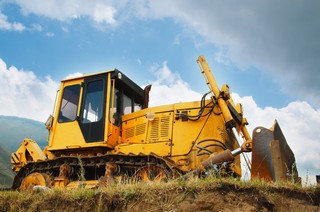Bulldozer Rentals and Leases for Any Size Job
 Renting or leasing is believed by many to be a costlier option in general, negating long-term value without the resale benefit that comes with ownership. But while that may be true of certain items, it’s often not the case with bulldozers and other large construction equipment.
Renting or leasing is believed by many to be a costlier option in general, negating long-term value without the resale benefit that comes with ownership. But while that may be true of certain items, it’s often not the case with bulldozers and other large construction equipment.
With a price tag that can travel north of $300,000 for mid-level dozers, renting or leasing can actually save money for landscaping companies, construction outfits, and similar businesses that use the equipment for specific jobs.
Here’s a breakdown of the three options available to you – renting, leasing, and buying – and how each can offer a series of pros and cons depending on your work volume and intended use.
Rent
This is a great first step if you plan on buying (or even leasing) a machine – in fact, it should be a requirement before either. Renting a bulldozer allows you to test drive the machine and discover whether or not it’s suited to your specific application. For this reason, many contractors use renting as a means of field testing before purchasing or committing to a long-term lease.
Renting is also ideal for quick jobs or seasonal work that, while profitable, doesn’t necessitate the purchase, storage, and maintenance of the machine year-round.
The one downside to renting is the cost. In the short-term, it’s relatively painless. But for jobs that extend for more than a few months, it may be more cost effective to consider a lease. On average, you can expect to pay:
There are a few other pluses when you rent. You don’t have to absorb any of the costs associated with maintenance, nor will you have to buy parts or pay service/repair fees if it breaks down. Depreciation costs are nonexistent and the equipment you or your operator will be using is almost always new or close to it. Plus, depending on your geographic location, you may be able to negotiate discounted rates on longer contracts – especially if you establish a relationship with the dealer.
Lease
Offering many of the same benefits of rentals, leasing a bulldozer is a popular choice among many landscaping professionals and contractors as it enables them to continually swap out equipment (often holding to a three-year changeover cycle) – avoiding downtime and costs associated with repairs.
Bulldozer leasing is typically available as either an operating or capital lease. Operating leases allow you to simply return the dozer when the lease is up while capital leases typically include a lease-to-purchase option in the contract. Generally speaking, the larger and more costly the bulldozer, the longer you can expect the lease to last. At the minimum, leases on construction equipment last a year to start and extend out from there.
What appeals most to landscaping pros and contractors is the potential for no down payment on the equipment and a tax deduction that can often be taken on an operating lease as a business expense. In the same way, a capital lease will often allow you to claim depreciation on the equipment at the end of the year.
It’s worth noting that by establishing a relationship with a single dealer, as mentioned in the rental option, you may be able to negotiate for better rates, especially when leasing multiple machines at the same time. That said, some studies claim that you can expect to pay 20% to 30% more for a leased machine in comparison to purchase. So it’s best to start with a firm understanding of your intended use and the costs it will entail over the long-run.
Plus, though many dealers will offer service and support packages, you may be expected to pay for any replacement parts, routine service, and repairs – not to mention insurance.
Buy
If your pockets are deep (or deep enough to absorb a 20% down payment), buying a bulldozer can save you some considerable money. These types of situations are often those where the machine contributes to a substantial portion of your operation – large construction firms and full-time landscaping businesses are two primary examples.
Among the biggest benefits are resale value and complete control over the use, care, and maintenance of the machine. You also build equity, further solidifying your businesses for future purchases. And, as is the case with renting or leasing, buying from the same dealer can get you big discounts against the base price on current and future purchases.
The downside is depreciation. Once you accept delivery, the dozer begins to lose value immediately, with newer, more advanced technology often replacing many of the controls and internal systems in five years or less. But if the math works out and it’s more cost-effective for you to buy, you can expect to pay $30,000 to $200,000 for a small to medium-output bulldozer, with an enormous selection of models in the $40,000 to $60,000 price range.
Be on the lookout for a warranty. Safety is important, no matter what you buy. But when purchasing a used bulldozer, safety, reliability and longevity become paramount concerns. The greater the number of in-service hours your forklift logs each week, the more susceptible it is to wear and damage. And while it’s important to have a qualified mechanic thoroughly inspect the machine before purchase, it’s also critical that it comes with a warranty.
Standard terms typically cover everything from filters to the power train. Though each agreement will be different, common warranty requirements encompass a period of three years or 3,600 hours and may even stipulate service response times – a maximum of 36 hours within notification is one such example.
Get Quotes
- We contact sellers
- They compete for your business